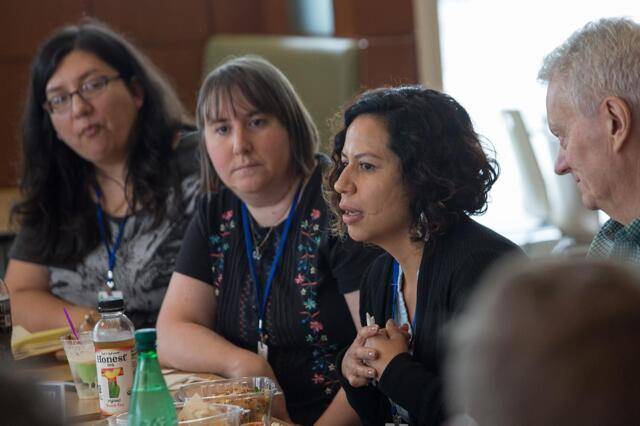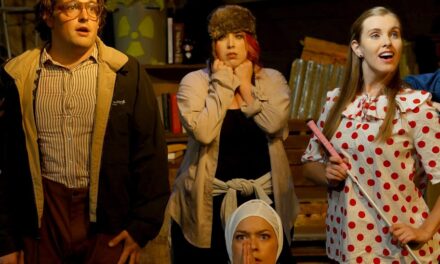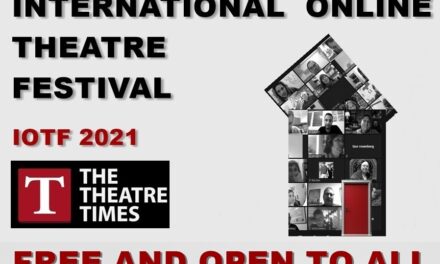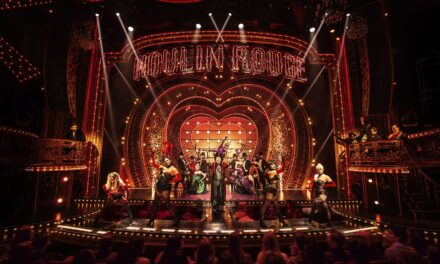What is a citizen-dramaturg? Could I study it at a university? Is it merely a state of mind? Would I need a certificate to practice? Until I participated in the 2023 Kennedy Center American College Theater Festival, a national program bolsters collegiate theater by evaluating student productions, I did not know. In response to my work as dramaturg for my university’s production of Oliver Lansley’s Ernest and the Pale Moon, I was selected for the LMDA/KCACTF Dramaturgy Award, an honor that extended me an invitation to the KCACTF Dramaturgy Fellows Online Intensive, my chance at becoming a citizen-dramaturg.
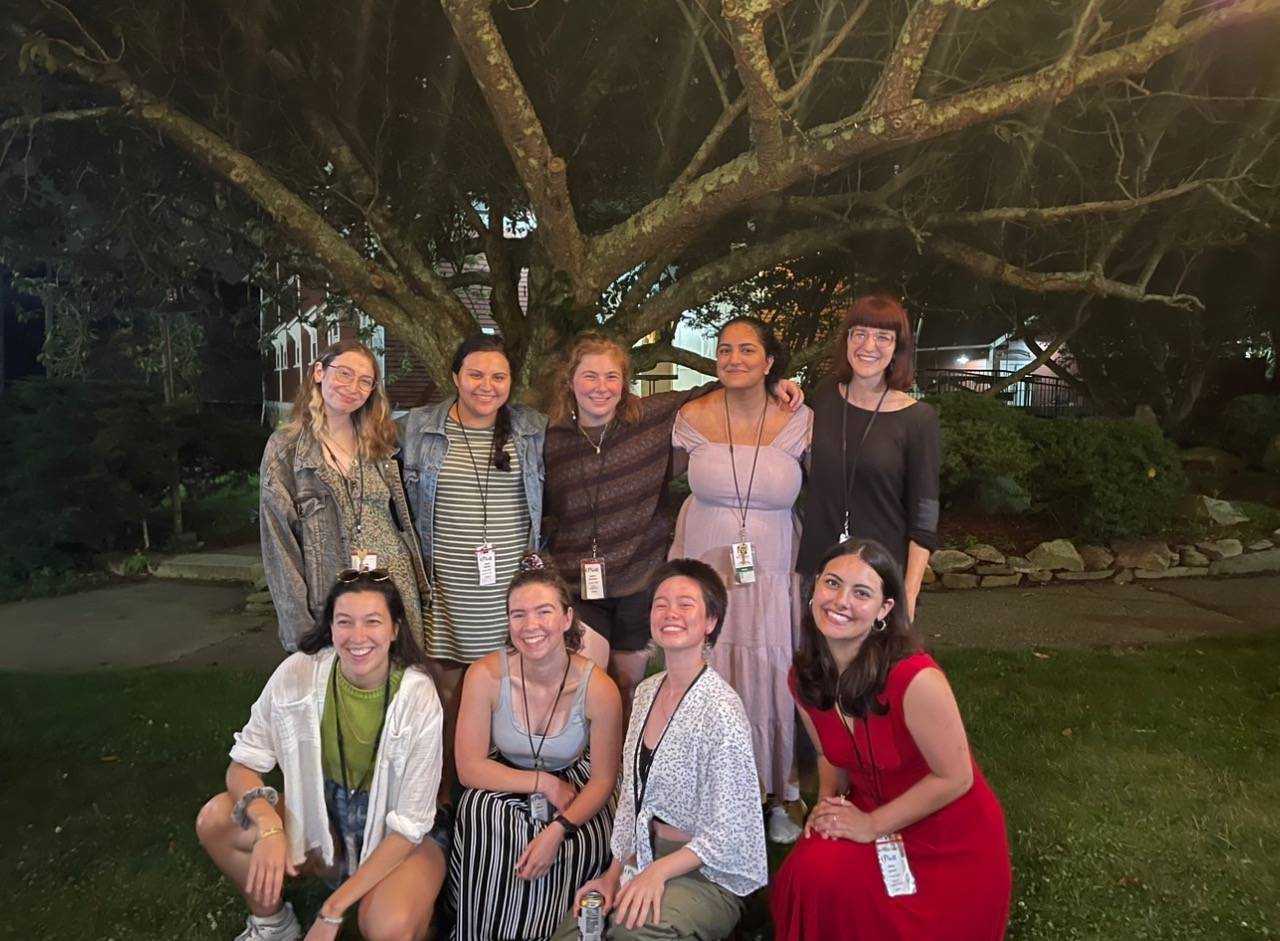
Photo Credits to Carrie Chapter
I was welcomed into the Online Intensive by hosts Gregg Henry, artistic director of KCACTF, Mark Bly, the Director and Co-Founder of the Kennedy Center Dramaturgy Intensive and Kelsey Mesa, Manager of Theater Education at The Kennedy Center. Mark kicked off the retreat with a workshop entitled “The Dramaturgical Impulse”, speaking passionately about the importance of becoming a “Citizen-Dramaturg”, by developing a sensitivity not only to our politicized and volatile society, but other artists. Mark, endorsing curiosity and “discovery over closure” in production dramaturgy, maintained that when we lack curiosity, “we begin to ignore other creatures of the earth, and ignoring others’ stories leads to a lack of empathy and activism.”
Lynde Rosario, President of the Literary Managers and Dramaturgs of the Americas expanded on the value of empathy in her segment, “The State of the Field”, discussing how we, as dramaturgs, must nurture the “shift in leadership and season planning models” that has emerged after the “We See You, White American Theater” document. This document, a letter to the entire theatre industry by Black, Indigenous and People of Color artists, surfaced during the Black Lives Matter movement of 2020, exposing “the indignities and racism that BIPOC, and in particular Black theatremakers, face on a day-to-day basis in the theater industry” and called for “substantive change in the American theater.” Lynde describes this responsibility to change as “building bridges and ladders” in the industry, declaring that “with visibility comes extreme accountability.”
The second day of the intensive began with Drew Lichtenberg, Resident Dramaturg for the Shakespeare Theatre Company, who delved into different archetypes of dramaturgs in “The Expanded Role of Dramaturgy in 2023”, and recalled a range of production experience, including such work as King Lear, detailing his year-long process working with the text and examining the plot, exploring themes such as gender, and questions such as “why does the Fool disappear completely from the play?”
One valuable conversation was followed by another, as Mark Bly moderated a discussion with major national literary managers Adrien-Alice Hansel, Otis Ramsey Zöe, Sonia Fernandez, and Naysan Mojgani. After delivering a list of questions to the panel, Mark unloaded the most activating of all, asking “what gives you joy?” Otis, Literary Manager of Arena Stage, offered that he finds joy in people, and in failure. His words made me stop in my tracks. Deriving joy from collaboration was generally shared among artists. But failure? As a student, this was the first time I had witnessed a professional find joy in failure, until I heard it again for a second time, as Adrien-Alice, Literary Director of The Studio Theatre, contributed that she can “get things wrong all the time”, and that “not everything is a crisis.”
By organizing an environment that encouraged vulnerability, humanity, and room for asking questions, Mark and Gregg offered emerging dramaturgs a retreat that challenged us to reflect on the field in a new light. Leaving the intensive as a newly minted citizen-dramaturg, I knew that while I would not always have the right answers, my inquisitiveness and vulnerability would be a start. After our time together, Mark and Gregg notified me that I had been selected to develop additional expertise at the Eugene O’Neill Theater Center as a Literary Fellow, assisting the Literary Office through their annual National Puppetry, Playwrights, Music Theater, and Cabaret and Performance Conferences.
Nothing could have prepared me for how drastically my life would change after arriving at the O’Neill. The direction of the incomparable Literary Manager Helena Pennington, Artistic Associate Rebecca Rovezzi, and Script Coordinator Audrey Erickson granted me an introduction to new play dramaturgy. I received a tremendous theatrical education. In the Literary Office, I soaked in hours of training, from troubleshooting the Xerox, to fostering a dramaturg-playwright relationship, to learning how to “take up space” at the table. Assisting in the rehearsal room, I was inspired watching the processes of ingenious dramaturgs, like Zeina Salame, and brilliant directors, such as Melia Bensussen, who, in 2024, was appointed Artistic Director of the National Playwrights Conference, create magic in the space.
Whether I was observing work at the writer’s table, participating in weekly Literary Office Salons, witnessing readings of new plays, or serving as Literary Representative on a new musical during the National Music Theater Conference, I was completely immersed, at all times, in awe-inspiring theater and leadership.
Though the overall training that I experienced at the O’Neill was superb, the profound connection I had with new friends and artists made my summer even more memorable. The Literary Office not only cultivated an excellent workplace, but built a close-knit family, cheering each other on. Most of what I learned at the O’Neill was not found in text, but the love and trust I had in my colleagues, who showered me with friendship and guidance. For the first time in my life, I felt seen.
As the end of my fellowship was approaching, I found myself wrestling with an insatiable fear: would I have an experience this fulfilling again? From what I knew about theater from the modern education system, jobs like these were a rarity, and I would have to compete mercilessly for each opportunity.
After confessing this at our final meeting of the season, Helena and Rebecca urged me to change my perspective. I was assured that this “scarcity mentality” was a myth, and that I had plenty of time to find my way. I was encouraged to travel, gain new perspectives, advocate for myself, and “take up more space.”
Taking up space, as a queer young woman and dramaturg, is no small task. No matter the experience that I have collected during my time with KCACTF and the O’Neill, I still fear that I will not be taken seriously. I have spent so much time developing my voice, and yet I am still afraid to use it.
In the midst of the continuous legal attacks against women and LGBTQ folks in the United States, it feels as though the world wants me to shrink. When it feels easier to succumb, I remember that wielding my power as a citizen-dramaturg is more important. Even when I am fearful, I’ll have the strength of envelope-pushing dramaturgs to draw from, who have taught me that vulnerability is strength. Vulnerability makes a citizen-dramaturg.
This post was written by the author in their personal capacity.The opinions expressed in this article are the author’s own and do not reflect the view of The Theatre Times, their staff or collaborators.
This post was written by Liv Lanteri.
The views expressed here belong to the author and do not necessarily reflect our views and opinions.

